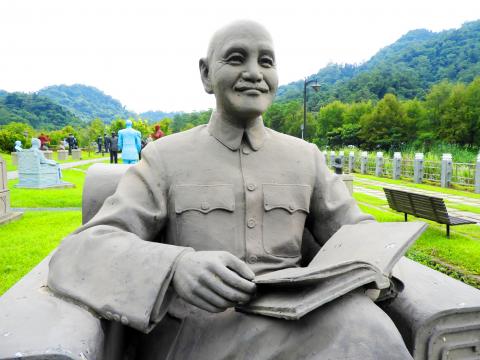The Transitional Justice Commission plans to complete its survey of roads named “Zhongzheng” (中正) — a name adopted by Chiang Kai-shek (蔣介石) — by September, it said on Saturday.
It wants to establish the number of roads nationwide with names symbolic of the nation’s authoritarian past, as well as the history behind the names.
The survey is being conducted in accordance with the Act on Promoting Transitional Justice (促進轉型正義條例), which establishes the illegality of symbolism commemorating the authoritarian period in public spaces, and requires such symbols to be removed, it said.

Photo: Chen Yu-fu, Taipei Times
The authoritarian-era Chinese Nationalist Party (KMT) government credited Chiang as the “savior of the Chinese race” and renamed numerous roads Zhongzheng as a way of having his name regularly spoken by the public, the committee said.
One of the most notable examples is Pingtung’s main street.
The road had long been nicknamed Coconut Grove Avenue (椰林大道) for the trees that line it on both sides, which give it a tropical island feel, but renaming it was done to evoke images of the then-president, the commission said.
Several other main roads around the nation were similarly renamed, including those in what is now New Taipei City’s Sinjhuang District (新莊), Houlong Township (後龍) in Miaoli County and Magong on Penghu, it said.
The government does not have complete records on the renamed roads, so the commission said it asked outside experts to assist it.
The commission last year began a survey of national parks to determine the number and location of statues of Chiang, and the road survey is a continuation of those efforts, it said.
Information provided by Minister of National Defense Yen De-fa (嚴德發) showed that there are 152 Chiang statues in the three branches of the military’s various facilities, it said.
Meanwhile, the issue of the huge statue at the Chiang Kai-shek Memorial Hall in Taipei has temporarily been put on hold, it said.
The Veteran Affairs Council and the Ministry of National Defense have expressed conservative positions on proposals to remove the statue, and a cross-departmental meeting would be convened to discuss it, the commission said.

Alain Robert, known as the "French Spider-Man," praised Alex Honnold as exceptionally well-prepared after the US climber completed a free solo ascent of Taipei 101 yesterday. Robert said Honnold's ascent of the 508m-tall skyscraper in just more than one-and-a-half hours without using safety ropes or equipment was a remarkable achievement. "This is my life," he said in an interview conducted in French, adding that he liked the feeling of being "on the edge of danger." The 63-year-old Frenchman climbed Taipei 101 using ropes in December 2004, taking about four hours to reach the top. On a one-to-10 scale of difficulty, Robert said Taipei 101

Nipah virus infection is to be officially listed as a category 5 notifiable infectious disease in Taiwan in March, while clinical treatment guidelines are being formulated, the Centers for Disease Control (CDC) said yesterday. With Nipah infections being reported in other countries and considering its relatively high fatality rate, the centers on Jan. 16 announced that it would be listed as a notifiable infectious disease to bolster the nation’s systematic early warning system and increase public awareness, the CDC said. Bangladesh reported four fatal cases last year in separate districts, with three linked to raw date palm sap consumption, CDC Epidemic Intelligence

Two Taiwanese prosecutors were questioned by Chinese security personnel at their hotel during a trip to China’s Henan Province this month, the Mainland Affairs Council (MAC) said yesterday. The officers had personal information on the prosecutors, including “when they were assigned to their posts, their work locations and job titles,” MAC Deputy Minister and spokesman Liang Wen-chieh (梁文傑) said. On top of asking about their agencies and positions, the officers also questioned the prosecutors about the Cross-Strait Joint Crime-Fighting and Judicial Mutual Assistance Agreement, a pact that serves as the framework for Taiwan-China cooperation on combating crime and providing judicial assistance, Liang

US climber Alex Honnold left Taiwan this morning a day after completing a free-solo ascent of Taipei 101, a feat that drew cheers from onlookers and gained widespread international attention. Honnold yesterday scaled the 101-story skyscraper without a rope or safety harness. The climb — the highest urban free-solo ascent ever attempted — took just more than 90 minutes and was streamed live on Netflix. It was covered by major international news outlets including CNN, the New York Times, the Guardian and the Wall Street Journal. As Honnold prepared to leave Taiwan today, he attracted a crowd when he and his wife, Sanni,